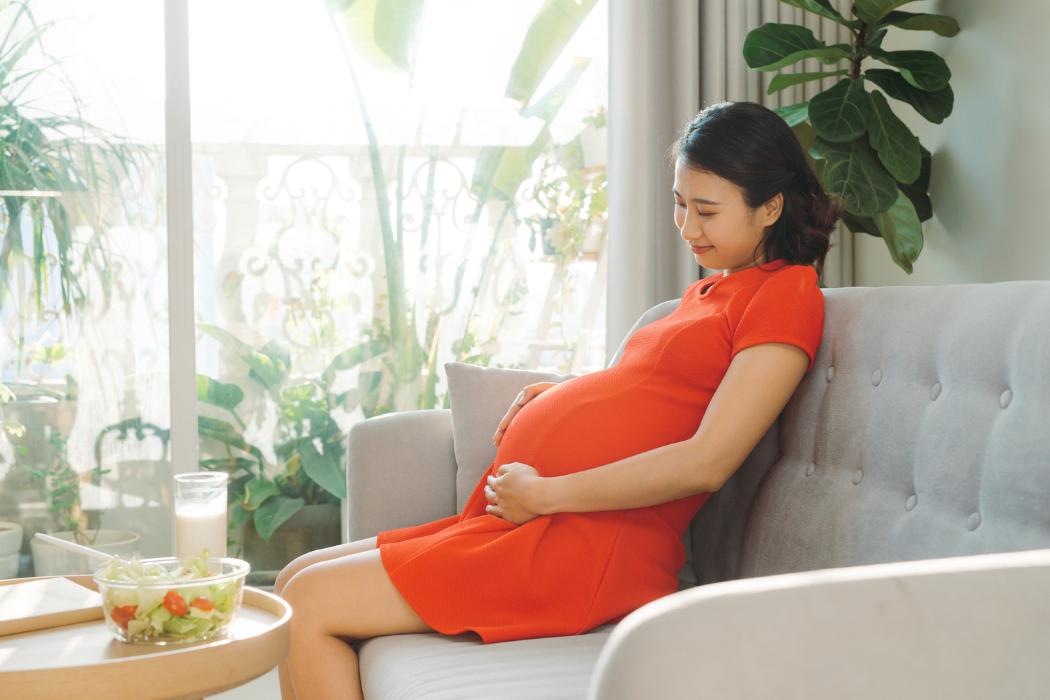Are you experiencing discomforts such as morning sickness, heartburn or constipation during pregnancy?
Pregnancy discomforts are quite common among many women.
Your body has a great deal to do during pregnancy especially with the changes that are taking place in your body.
It will cause irritation or discomfort, and on occasions, they may seem quite alarming.
But do not fret, as there is rarely any need for alarm but you should mention anything that is worrying you to your doctor.
Check out these tips that would help you ease these discomforts during pregnancy.
1. Easing Morning Sickness

Morning sickness, also called nausea, vomiting of pregnancy, or pregnancy sickness, affects most pregnant mothers.
The nausea could be mild or induce actual vomiting. In extreme cases, known as hyper emesis gravid arum, hospitalisation may be required to treat the resulting dehydration.
It could occur at any time of the day, though it occurs most often upon waking, because blood sugar levels are typically the lowest after a night without food.
Morning sickness usually starts in the first month of the pregnancy, peaking in the fifth to seventh weeks, and continuing until the fourteenth to sixteenth week.
For half of the sufferers, it ends by the sixteenth week of pregnancy.
It may take the others up to another month to get relief. Some expecting mothers suffer intermittent episodes throughout their pregnancy.
Tips to ease morning sickness
- Avoiding an empty stomach.
- Have several small meals throughout the day instead of fewer large ones. For instance, try having five or six small meals per day, rather than three large ones.
- Drink small cups of ginger or peppermint tea. Or take ginger in other forms such as capsules or ginger snaps.
- Slowly eat a dry cracker, dry bread, or dry cereal before getting out of bed.
- Avoid sudden movements when you’re getting out of bed — take your time.
- Drink fluids between meals rather than with your meals. Drinking liquids 30 to 45 minutes after eating solid food is recommended.
- Avoid greasy and fried foods.
- Drink a little fruit juice or non-caffeine soda when you feel nauseated between meals.
- Avoid strong spices and odours.
2. Relieving the Burning Sensation

More than one-half of all pregnant mothers reported symptoms of severe heartburn, particularly during their second and third trimesters.
Heartburn, also called acid indigestion, is an irritation or burning sensation of the oesophagus caused by stomach contents that reflux (come up) from the stomach.
Heartburn may occur during pregnancy because of changing hormone levels, which could affect the muscles of the digestive tract and affect how different foods are tolerated.
Pregnancy hormones can cause the lower oesophageal sphincter (the muscular valve between the stomach and oesophagus) to relax, allowing stomach acids to splash back up into the oesophagus.
In addition, the enlarged uterus could crowd the abdomen, pushing stomach acids upward.
The good news is heartburn usually disappears following childbirth.
Tips to relieve heartburn
- Eat several small meals each day instead of three large ones and try eating slowly. As the baby grows, it pushes against the stomach, so there is less and less room for large meals.
- Avoid fried, spicy or rich foods, or any foods that seem to cause relaxation of the lower oesophageal sphincter and increase the risk of heartburn.
- Drink less while eating. Drinking large amounts while eating may increase the risk of acid reflux and heartburn.
- Don’t lie down for at least an hour after eating.
- Keep the head of your bed higher than the foot of your bed. Or place pillows under your shoulders to help prevent stomach acids from rising into your chest.
- If your heartburn persists, ask your doctor to prescribe medications, which are safe to take during pregnancy. You may find that liquid heartburn relievers are more effective in treating heartburn as they coat the oesophagus.
- Wear loose-fitting clothing, as tight-fitting clothes could increase the pressure on your stomach and abdomen.
3. Relieving Constipation
Constipation occurs when there is abdominal pain or discomfort, difficult and infrequent bowel movements, and the passage of hard stools.
Unfortunately, constipation affects approximately half of all expectant mothers at some point during their pregnancy.
In general, worry, anxiety, minimal physical exercise, and a low-fibre diet may cause constipation.
Constipation in pregnant mums is thought to occur due to hormones that relax the intestinal muscle and by the pressure of the expanding uterus on the intestines.
Relaxation of the intestinal muscle causes food and waste to move slower through your system.
Sometimes iron tablets may contribute to constipation.
Make sure you are drinking plenty of water if you are taking iron supplements.
You may need to switch to a different type of iron tablet, but it is important to talk to your doctor first.
Avoiding constipation could help protect against haemorrhoids, which could be caused by spending lengthy time sitting on the toilet.
Tips to prevent or treat constipation

Prevention and treatment of constipation involve much of the same thing.
Here are a few things that you can do to help prevent constipation from occurring or treat it if you are already experiencing it:
- Eat a high fibre diet. Ideally, you will consume 25 to 30 grams per day of dietary fibre from fruits, vegetables, breakfast cereals, whole grain breads, prunes and bran. Also, try to have meals at regular times.
- Drink lots of fluids. Drinking plenty of fluids is important, particularly with your increase in fibre intakes. Drink 10 to 12 cups of fluids each day. It is the combination of a high fibre diet and lots of liquid that best help you eliminate your waste. Sweat, hot and humid climates, and exercise may increase your need for additional fluids.
- Exercise routinely. If you are inactive, you have a greater chance of constipation. Walking, swimming and other moderate exercises help the intestines work by stimulating your bowels. It is recommended that you schedule exercise three times a week for 20 to 30 minutes each, but make sure your workouts regimen is appropriate and safe to perform during pregnancy. Always consult your doctor before starting any exercise programme during your pregnancy.
- Taking iron supplements sparingly. Talk to your doctor about checking your iron levels and recommendations to manage iron intake during pregnancy. Iron supplements may contribute to constipation. Since good nutrition can often meet your iron needs during pregnancy, you may take smaller doses of iron throughout the day rather than taking it all at once, to help reduce constipation.
BEWARE OF…
- Over-the-counter remedies. There are over-the-counter products that may help soften your bowel movements and reduce constipation. Always speak to your doctor before using over-the-counter medications.
- Laxative pills. Laxative pills are NOT recommended for the treatment of constipation during pregnancy because they might stimulate uterine contractions and cause dehydration.
- Mineral oils. Mineral oils should NOT be used during pregnancy because there is an increased reduction in nutrient absorption.














